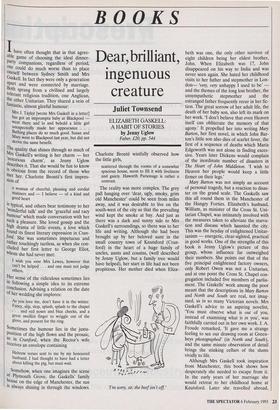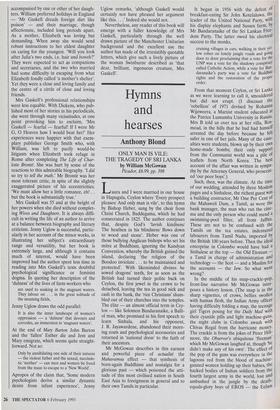BOOKS
Dear,brilliant, ingenuous creature
Juliet Townsend
ELIZABETH GASKELL: A HABIT OF STORIES by Jenny Uglow Faber, £20, pp. 544 Ihave often thought that in that agree- able game of choosing the ideal dinner- Party companions, regardless of period, one could do much worse than to place oneself between Sydney Smith and Mrs Gaskell. In fact they were only a generation apart and were connected by marriage. Both sprang from a civilised and largely tolerant religious tradition, one Anglican,
Mrs J. Taylor [wrote Mrs Gaskell in a letter] has got an impromptu baby at Blackpool went there and lo and behold a little girl unexpectedly made her appearance . . . Bathing places do so much good. Susan and Mary went to Blackpool last year, but did not derive the same benefit.
The quality that shines through so much of Mrs Gaskell's writing is her charm — her notorious charm', as Jenny Uglow describes it. That she would be fun to know is obvious from the record of those who met her. Charlotte Bronte's first impres- sion of
a woman of cheerful, pleasing and cordial manners and — I believe — of a kind and good heart
i‘a typical, and others bear testimony to her wonderful talk' and the 'graceful and racy humour' which made conversation with her such a pleasure. She loved gossip and the high drama of little events, a love which found its finest literary expression in Cran- ford. She was sometimes impetuous and rather touchingly tactless, as when she con- cluded her first letter to George Eliot, whom she had never met: I wish you were Mrs Lewes, however that can't be helped . . . and one must not judge others.
Her sense of the ridiculous sometimes lies In following a simple idea to its extreme conclusion. Advising a relation on the date of her wedding she implores:
As you love me, don't have it in the winter. Fancy, slip, slop, splash, splash to the chapel • • . and red noses and blue cheeks, and a great swollen finger to wriggle out of the glove, and present for the ring.
Sometimes the humour lies in the juxta- position of the high flown and the prosaic, as M Cranford, when the Rector's wife receives an envelope containing Hebrew verses sent to me by my honoured husband. I had thought to have had a letter about killing the pig, but must wait.
Somehow, when one imagines the scene at Plymouth Grove, the Gaskells' family house on the edge of Manchester, the sun is always shining in through the windows.
Charlotte Bronte wistfully observed how the little girls, scattered through the rooms of a somewhat spacious house, seem to fill it with liveliness and gaiety. Haworth Parsonage is rather a contrast.
The reality was more complex. The grey pall hanging over 'dear, ugly, smoky, grim old Manchester' could be seen from miles away, and it was desirable to live on the south-west of the city so that the prevailing wind kept the smoke at bay. And just as there was a dark and sunny side to Mrs Gaskell's surroundings, so there was to her life and writing. Although she had been brought up by her beloved aunt in the small country town of Knutsford (Cran- ford) in the heart of a huge family of uncles, aunts and cousins, (well described by Jenny Uglow, but a family tree would have helped), her start in life had not been propitious. Her mother died when Eliza- I'm sorry, sir, the beef isn't of beth was one, the only other survivor of eight children being her eldest brother, John. When Elizabeth was 17, John disappeared on his way to India and was never seen again. She hated her childhood visits to her father and stepmother in Lon- don— 'very, very unhappy I used to be' and the themes of the long lost brother, the unsympathetic stepmother and the estranged father frequently recur in her fic- tion. The great sorrow of her adult life, the death of her baby son, also left its mark on her work. 'I don't believe that even Heaven itself can obliterate the memory of that agony.' It propelled her into writing Mary Barton, her first novel, in which John Bar- ton's little son also dies of scarlet fever, the first of a sequence of deaths which Maria Edgeworth was not alone in finding exces- sive. Years later Dickens would complain of the inordinate number of disasters in The Heart of John Middleton. 'I wish to Heaven her people would keep a little firmer on their legs.'
Mary Barton was not simply an account of personal tragedy, but a reaction to disas- ter on the grand scale. The Gaskells saw this all round them in the Manchester of the Hungry Forties. Elizabeth's husband, William, as minister of the Cross St. Uni- tarian Chapel, was intimately involved with the measures taken to alleviate the starva- tion and disease which haunted the city. This was the heyday of enlightened Unitar- ianism — energetic, clear-sighted, practical in good works. One of the strengths of this book is Jenny Uglow's picture of this group, whose influence far outweighed their numbers. She points out that of the five principal enlightened factory owners, only Robert Owen was not a Unitarian, and at one point the Cross St. Chapel con- gregation included five members of parlia- ment. The Gaskells' work among the poor meant that the descriptions in Mary Barton and North and South are real, not imag- ined, as in so many Victorian novels. Mrs Gaskell's advice to an aspiring novelist, `You must observe what is out of you, instead of examining what is in you', was faithfully carried out in her own work. J. A. Froude remarked, `It gave me a strange feeling to see our drawing room at Green- heys photographed' (in North and South), and the same minute observation of detail brings the stinking cellars of the slums vividly to life.
Although Mrs Gaskell took inspiration from Manchester, this book shows how desperately she needed to escape from it. In the early years of her marriage she would retreat to her childhood home at Knutsford. Later she travelled abroad, accompanied by one or other of her daugh- ters. William preferred holidays in England — 'Mr Gaskell dreads foreign diet like poison' — and their marriage, though affectionate, included long periods apart. As a mother, Elizabeth was loving but demanding. When away she would send robust instructions to her eldest daughter on caring for the youngest. Will you look after Julia's two ends, i.e. hair and bowels?' They were expected to act as companions and secretaries, and the two who married had some difficulty in escaping from what Elizabeth fondly called 'a mother's shelter'. Yet they were a close and loving family and the centre of a circle of close and loving friends.
Mrs Gaskell's professional relationships were less equable. With Dickens, who pub- lished most of her stories in his periodicals, she went through many vicissitudes, at one point provoking him to exclaim, 'Mrs Gaskell — fearful — fearful! If I were Mr G, 0 Heaven how I would beat her!' Her experiences were happier with that exem- plary publisher George Smith who, with William, was left to pacify would-be litigants when Elizabeth took refuge in Rome after completing The Life of Char- lotte Brontë. She was hurt by some of the reactions to this admirable biography. 'I did so try to tell the truth.' Mr Brontë was her most tolerant critic, in spite of the slightly exaggerated picture of his eccentricities. 'We must allow her a little romance, eh! . . but the book is substantially true.'
Mrs Gaskell was 55 and at the height of her powers when she died without complet- ing Wives and Daughters. It is always diffi- cult in writing the life of an author to arrive at a balance between biography and literary criticism. Jenny Uglow is successful, partic- ularly in her account of the minor works, in illustrating her subject's extraordinary range and versatility, but her book is extremely large, and although it contains much of interest, would have been improved had the author spent less time in reading into Mrs Gaskell's texts doubtful psychological significance or feminist dogma. In quoting her description of the 'dulness' of the lives of farm workers who
are used to soaking in the stagnant waters.
They labour on . . . in the great solitude of the steaming fields,
Jenny Uglow draws the odd parallel:
It is also the inner landscape of women's oppression — a 'dulness' that devours and corrodes, an immersion in 'stagnant waters'.
At the end of Mary Barton John Barton and the 'fallen' Esther die and Jem and Mary emigrate, which seems quite straight- forward. Not so:
Only by annihilating one side of their natures — the violent father and the sexual, narcissis- tic 'mother' — can men and women be freed from the maze to escape to a 'New World'.
Apropos of the claim that, 'Some modern psychologists derive a similar dynamic desire from infant experience', Jenny Uglow remarks, 'although Gaskell would certainly not have phrased her argument like this. . ..' Indeed she would not.
Nevertheless, any reader of this book will emerge with a fuller knowledge of Mrs Gaskell, particularly through the well drawn picture of the Manchester Unitarian background and the excellent use the author has made of the irresistibly quotable letters, which give such a lively picture of the woman Swinburne described as 'that dear, brilliant, ingenuous creature, Mrs Gaskell'.























































 Previous page
Previous page